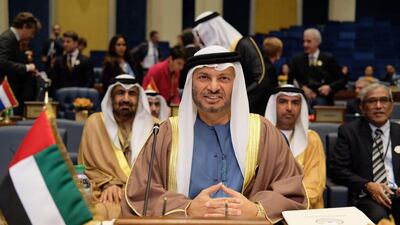Arabian Gulf countries and institutions have pledged almost 10 per cent of the estimated $88 billion needed to rebuild Iraq after the country's gruelling three-year war with ISIL.
The pledges came on the final day of an international donor conference in Kuwait where Iraqi officials have made the case for foreign investment in what they said would be "a new Iraq".
The loans and investments will go toward the projected $88 billion the World Bank said is needed for reconstruction in Iraq. Vast swaths of territory remain devastated because of damage inflicted by ISIL and in subsequent battles against the insurgents.
Pledges were still expected to fall short of the level desired. Officials have earmarked the urgent need for $23 billion in short term loans, with the remaining $65 billion to be gathered over the mid term. Kuwait's Ministry of Foreign Affairs said a total of $30 billion had been secured at the conference. That figure, however, included not only the contributions made by the 76 countries attending but also international organisations and private sector deals. It was also unclear how much of the $30 billion represented loans.
Iraq's public finances remain dependent on oil and the government is also trying to modernise an economy that has long suffered from corruption and bureaucracy. The aim is to attract and absorb private sector foreign investors. Such finance, donor countries said, is necessary to raise the total funds needed for Iraq.
Contributions came in two forms, loans, where countries are giving to Iraq reconstruction projects, and investments from both the private and government sector.
_____________
We discuss Iraq's reconstruction efforts in this week's edition of Beyond the Headlines podcast:
_____________
Senior officials told The National the loans made by several of the countries are at low interest rates and given with the presumption of default.
Sheikh Sabah, the Emir of Kuwait and host of the three day international donor conference, announced on Wednesday $1-billion in loans for reconstruction projects in Iraq and another $1-billion of investments to help rebuild areas wrecked by ISIL.
"Iraq is required today to start a comprehensive reconstruction of the infrastructure and facilities that were destroyed. It cannot be undertaken alone, which calls us to the international community to take part of this mission,” he said on the last day of the conference in Kuwait City.
The pledge came as a surprise as Iraq is also set to resume payments to fully meet the $4.6 billion still owed to Kuwait in reparations for the destruction of oil production during the Gulf War.
Turkey announced $5 billion in loan funds and credit easing, while the Islamic Development Bank announced a contribution of $500 million.
Dr Anwar Gargash, UAE minister of state for foreign affairs, announced the United Arab Emirates would pledge $500 million.
Dr Gargash later tweeted that there would also be $5.5 billion from the UAE in private investments in Iraq "in addition" to his country’s pledge but it was not clear if this was a new announcement.
Saudi Arabia pledged $1.5 billion while the Kuwait-based Arab Fund says Iraq will receive $1.5 billion in infrastructure aid in coming years.
Qatar, which has been isolated from a quartet of Arab nations, announced it would contribute $1 billion with Germany pledging another 400 million euros, and the European Union 400 million euros.
Iraq's Prime Minister Haidar Al Abadi said he was looking forward to "real and strategic" partnerships, as well as collaborations with countries in the region.
Mr Al Abadi said that the Iraqi "vision" would rely on the principle of cooperation for Iraq to become a "gateway for joint interests".
“It was a bloody and tough war, our homes were destroyed, schools devastated, streets turned into battlefields, we tolerated this because not only were we fighting for Iraq but for all humanity,” he said.
Mr Abadi also said Baghdad was seeking to restore confidence in an international community suffering from donor fatigue.
United Nations Secretary General Antonio Guterres urged the international community to address the scope of devastation that the war in Iraq has caused, saying the UN is firmly committed to the reconstruction process in Baghdad, which he reiterated would be a "daunting task... to ensure a unified nation."
The UN chief also highlighted the need for an "all-inclusive reconciliation process", calling on Iraqi authorities to abide by UN Resolution 1325, which addresses the impacts of armed conflicts on women.

